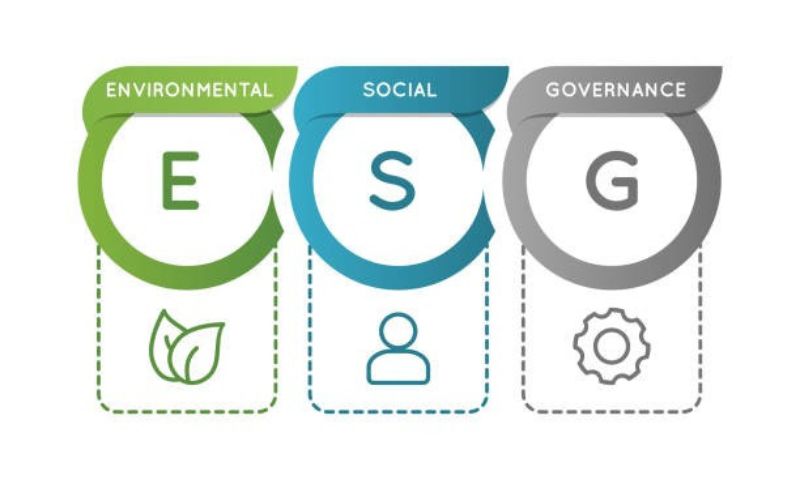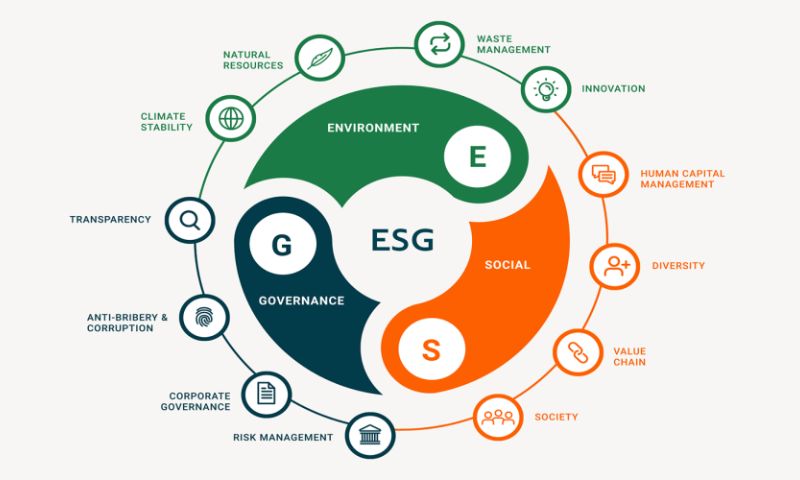ESG in Mainstream Investment Strategies: it isn’t just a buzzword anymore—it’s the new edge in smart money moves. Gone are the days when profits alone ruled the markets. Today, we’re steering toward a future where cash flows blend with eco and social savvy. It’s time to unpack how this trio—environment, social and governance (ESG)—scores big for investors hunting gains with a conscience. Strap in, because your portfolio is about to get greener and your returns, stronger. Let’s break down the essentials of sustainable investing and watch the old-school playbooks evolve.
The Evolution of Sustainable Investing in Modern Portfolios
Understanding ESG Criteria and Its Significance
Think of a world where money works for more than just profit. It’s a place where it also looks out for the planet and people. This is what ESG criteria are all about. ESG criteria make us think about how companies do business. It’s not just about what they make, but also about how they treat their workers, and our environment, and whether their leaders are making fair choices.
When we talk about ESG criteria, we mean three big areas. There’s “E”, standing for environmental. That’s things like clean air and using less energy. Then “S” for social, which is all about good working conditions and supporting the communities. Lastly, “G” for governance. That’s making sure a company is run in a way that’s right and fair.
The Integration of ESG Factors in Investment Decisions
Now, why mix ESG into investing? Well, it’s like picking a team for the long haul. You want players who are not just strong now, but who can also play the game right and stay strong for seasons to come. ESG factors help us pick these players in the world of business. Companies that care for ESG stuff can often handle tough times better. This means they can be a smart choice for people who want to make money and do good at the same time.
When we look at companies through the ESG lens, we’re thinking about risks that we might not see if we just looked at the money side. For instance, if a company doesn’t care about keeping its workers safe, it could face big fines or lose workers. This could hurt the company and as a result, people who invested in it.
Or think about climate change. Companies that are getting ready for this challenge might be better off in the future. Integrating ESG means thinking about all this stuff when deciding where to put money. It’s like checking the weather before a big game.
Smart asset managers use ESG to build investment strategies that aim to win not just today, but far into the future. They look at lots of data and reports to see how companies score on ESG points. Then they use this info to decide where to put money to good use.
In the past, some folks thought that caring about ESG might mean making less money. But that’s not the case anymore. Now, more and more people see that ESG can go hand in hand with good returns. And, it makes them feel good about where their money’s going.
There’s a lot to get into with ESG – beyond good vibes and nice stories. It’s serious business. As the world digs deeper into what sustainability means, ESG is more and more part of everyday investing talk. It’s not just a trend; it’s how the smart money is moving. And it’s all for a future where we all win – our wallets, our people, and our planet.

Evaluating the Impact of ESG on Financial Performance
How ESG Ratings Influence Investor Choices
When you pick a stock or fund, think of ESG like a health check for companies. ESG ratings help us see how firms do with green rules, how they treat people, and their leaders’ choices. Good ESG scores can attract investors. They show a company cares more than just making money. It shows they think long-term and avoid big risks.
For example, a firm with high ESG standards might use less water and energy, saving money over time. They also treat workers well, which can mean folks stay longer and work harder. It’s like picking a soccer team with healthy, happy players. They’re set to win more games. This way, using ESG ratings is like betting on the best teams.
Risk Management Through ESG Compliance
No one likes surprises in investing, right? That’s where ESG comes in handy. Good ESG practices can lower the chances of bad news like lawsuits, strikes, or fines. What’s more, investors now see that climate change can hit their wallets. Firms that ignore it may face tough times ahead.
So, when a company follows ESG rules, it’s like having a sturdy fence around your house. It helps keep trouble out. Think of big oil spills or unsafe workplaces. These issues can cost a lot to fix and can even ruin a brand. But if the company cared for ESG stuff, it might have dodged these mishaps.
That’s why more people now want part of their money in ESG-focused funds. And, asset managers are listening. But, it’s not just about risks. We want our money to help fix big world problems like poverty and dirty air. Investing in firms with good ESG practices lets us push for this change.
And let me tell you, this isn’t just feel-good talk. Data backs it up. Funds that ace ESG tests often do as well or even outshine those that don’t.
To wrap up, ESG makes good business sense. It digs into how a firm runs, which can affect its stock price. As for us investors, using ESG ratings can guide us to safer, smarter choices. And we play a part in making things better for everyone. That’s a win-win in my book.
Trends and Strategies in ESG Investment
Asset Managers’ Approach to Responsible Investing
Asset managers wear big shoes in the world of money. They decide where pots of cash get poured. Now, sustainable investing isn’t a tiny, cute idea—it’s big news. Why? Because it’s clear as day: good ESG criteria can boost your bid for profit. Let’s dig in. Asset managers spot risks like hawks. They know storms of bad ESG can shake up stocks. But it’s not all about dodging danger. They see gold in those green hills—businesses that do good can also do well. With nifty tools and sharp smarts, they weave ESG into every choice they make.
Ever heard about the term “ESG integration”? It’s when asset managers mix ESG with other smart moves to pick stocks. They ask hard questions. How’s the company’s game with climate change? What’s up with how they treat folks who work for them? And yup, they peek at how tight the ship is run, too. If all signals flash green, they might just bet on them. It’s like a health check – for profits and the planet.
The Rise of Thematic Funds Focused on ESG
Jumping onto a trending train, that’s thematic funds for you. No shock, ESG’s stars are rising fast in this space. What makes them tick? They pick a theme, let’s say clean energy, and go all in. It’s like putting all your Easter eggs in baskets with a future. These funds look for trends, like how the world’s trying to cut gas that warms up the earth. They bet on this need growing, not shrinking. Smart, right? It’s a choice made with the head and the heart.
So, your next question – is tossing cash into these funds worth your while? To tell it straight, ESG funds are doing the happy dance right now, often dancing past others. Why? They focus on stuff that’s got room to grow. With folks pushing for a cleaner world, ESG funds could get a major green boost.
Investing in ESG isn’t just tree hugging with your wallet. It’s street-smart finance with a shine of good doing. It blends knowing the world with knowing your bucks. And as more ears perk up for good ESG stories, these funds just might be your golden goose. So it’s clear, ESG isn’t a sidekick in the investing tale—it’s ready for the hero shot.
Take it from someone who’s seen the charts and heard the chimes – ESG’s not a wave; it’s the tide turning. Every smart investor needs to know the sway of ESG, just like they know their ABCs. And trust me, this wave’s got room for all to surf to a sunnier, richer horizon. So, buddy up with ESG—it’s not just nice, it’s money-wise.

ESG and Ethical Investment: Building a Sustainable Future
The Role of Green Bonds in ESG Portfolios
Green bonds are like a superhero for the planet. They are loans people give to companies to fund good stuff for the earth. Think of trees, clean air, and oceans full of fish—that’s what green bonds help protect and grow. Asset managers love green bonds because they make money while also doing good.
When someone buys a green bond, they’re lending money to make big eco-friendly projects happen. These could be solar power plants, wind farms, or clean transport. Big groups like the World Bank or companies focused on green energy sell these bonds. People who care about the earth buy them. And over time, they get their money back with interest. It’s a win-win!
Now, you might ask, “Are green bonds good for my money?” The quick answer is, yes! They are safe and often have nice returns. Plus, as more people want to help the earth, green bonds get more popular. This means they could be worth more in the future.
But, it’s not all about cash. Green bonds make you part of a club that’s fighting climate change. And let’s face it; a happy planet means happy people and animals. It’s about making sure our kids and their kids can enjoy the world just like we do.
How ESG Drives Long-Term Asset Allocation and Returns
When investing, it’s smart to think long-term, and here’s where ESG criteria shine. They are like a secret recipe for cooking up a great future. ESG stands for environmental, social, and governance. In simple words, it’s all about helping the earth, people, and making sure companies play fair.
If you’re an investor, using ESG criteria helps you find companies that are in it for the long haul. These companies don’t just want quick money. They work on stuff that matters, like keeping the water clean or making sure workers are happy and safe. And guess what? Happy workers and clean water are good for business, too.
Companies that follow ESG criteria are less likely to hit big problems. This means less risk for you and possibly more dough in your pocket down the road. It’s like putting on a seatbelt; it keeps your money safe on the wild ride of the stock market.
So, can ESG impact how much money you make? You bet! Investing with ESG in mind often means betting on companies that will still be around and kicking butt in the future. These companies are looking ahead, ready to tackle things like climate change. Because let’s face it, climate change is not going away, and we need strong companies to fight it.
In a nutshell, ESG helps you build a money-making team that’s ready for the long game. It’s about putting your cash in the hands of folks who care about doing the right thing. And when they do good, you do good. It’s a pretty sweet deal. Plus, you get to tell your friends you’re helping the world with your smart investments. Now who wouldn’t want that?
In this post, we took a close look at how smart investing today cares about more than just money. We learned about ESG criteria and why it matters in where we put our cash. We also saw how adding ESG to our money choices helps us manage risk and pick winners.
We talked about how the money world is changing, with asset managers focusing more on investing with a clear conscience. More funds now turn to themes that care about our world’s future.
Then, we explored green bonds and their big role in ESG investing. We discovered how thinking about ESG can make our investments do well over time while doing good.
In the end, putting money in ESG is not just a trend; it’s shaping our tomorrow. Every dollar we invest with ESG in mind helps build a world we can all look forward to. It’s not just smart; it’s right. Let’s keep our planet and future in mind as we make our money work for us.
Q&A :
What is ESG and how is it integrated into mainstream investment strategies?
ESG stands for Environmental, Social, and Governance, and it refers to the three central factors in measuring the sustainability and societal impact of an investment in a company. Integrating ESG into mainstream investment strategies involves the inclusion of ESG criteria in investment analysis and decision-making processes, with the objective of identifying material risks and growth opportunities, and potentially enhancing long-term financial returns. Investors may use ESG screening, shareholder engagement, and integration strategies to ensure their portfolios align with certain ethical principles.
How do ESG factors influence investment decisions?
ESG factors influence investment decisions by providing a framework for evaluating how a company’s practices might impact its performance and risk profile. For instance, environmental factors consider a company’s stewardship of the environment, social factors look at how it manages relationships with employees, suppliers, customers, and communities, and governance deals with a company’s leadership, executive pay, audits, internal controls, and shareholder rights. Investors may favor companies with strong ESG practices, as they can be seen as better positioned to navigate legal and regulatory challenges, adapt to societal changes, and maintain their reputations.
Why has ESG become a priority in investment portfolios?
ESG has become a priority in investment portfolios for several reasons, including increasing awareness of social and environmental issues, regulatory changes, and the recognition that sustainable business practices can lead to long-term financial success. Furthermore, many investors believe that companies with robust ESG commitments are better equipped to mitigate risks, capitalize on opportunities associated with sustainability trends, and maintain a competitive edge. The growing demand from institutional investors, shareholders, and customers for transparent and responsible corporate behavior also drives ESG consideration.
What are the challenges of incorporating ESG into investment strategies?
Incorporating ESG into investment strategies can present challenges such as a lack of standardized metrics for measuring ESG performance, varying reporting standards, and difficulties in fully integrating ESG data with traditional financial analysis. Additionally, there can be a misconception that ESG factors come at the cost of financial returns, although research indicates that companies with strong ESG records often perform as well as or better than their peers over the long term. Overcoming these challenges may involve enhanced analysis tools, improved data quality, and ongoing education for investors.
How does ESG investing align with financial performance?
ESG investing can align with financial performance by shedding light on potential risks and opportunities that may not be captured by conventional financial analysis. A company’s ESG practices could have a significant impact on its operational efficiency, legal and regulatory compliance, and reputation—all of which can ultimately affect its bottom line. Companies with positive ESG performance can attract and retain talent, innovate, and respond to changing consumer preferences more effectively. Many studies have shown that strong ESG credentials can correlate with higher financial returns and lower volatility, suggesting that integrating ESG considerations can indeed go hand-in-hand with sound financial performance.




